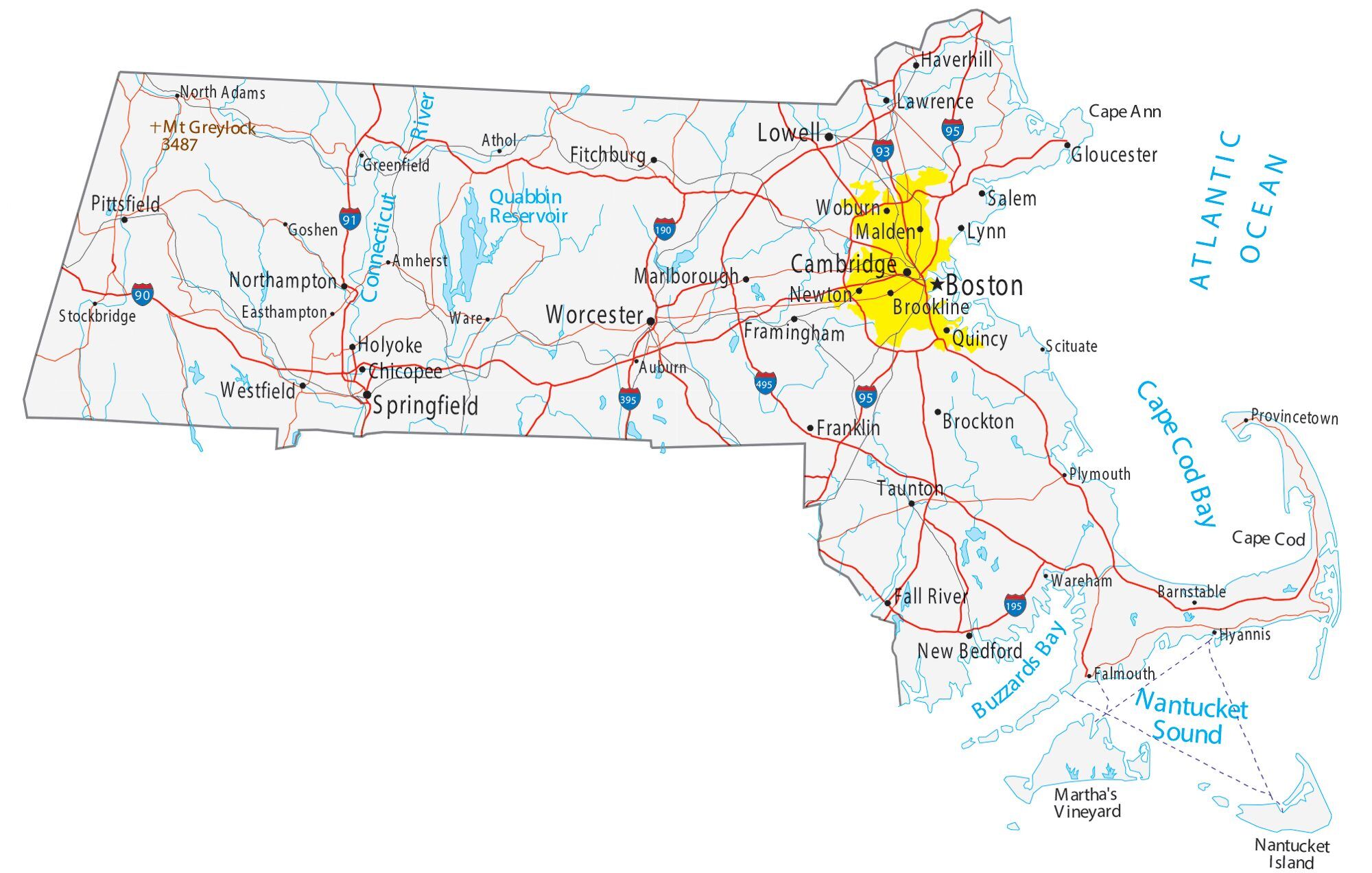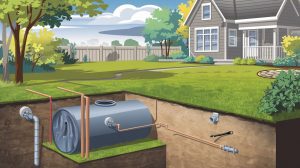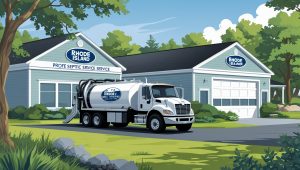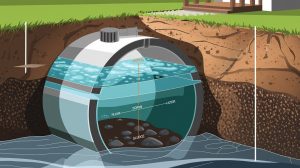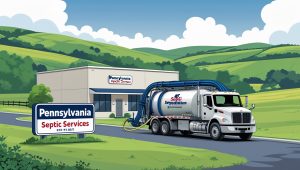Proper management of septic systems is critical to protecting public health and the environment in Massachusetts. The state enforces detailed regulations, including Title 5 of the Massachusetts Environmental Code, which governs the installation, maintenance, and inspection of septic systems. Homeowners, property buyers, and developers must understand these laws to ensure compliance and avoid costly penalties.
Table of Contents
- State-Specific Regulations Information
- Compliance Information
- Cost Information
- Local Resources & Contact Information
- Supportive Resources
- FAQs About Massachusetts Septic Laws
State-Specific Regulations Information
Installation Permits
If you’re planning to install or replace a septic system in Massachusetts, obtaining a permit is mandatory. The local board of health oversees the permitting process, ensuring all installations meet state and local requirements.
- Permit Costs: Massachusetts septic tank permits typically range from $100 to $500, depending on the municipality. Some towns may also charge fees for soil evaluations and plan reviews.
- Approval Process: The process includes a detailed review of site evaluations, soil testing, and percolation tests to assess drainage suitability. Homeowners are encouraged to work with licensed engineers or sanitarians to prepare accurate system designs.
For additional information on permits, visit the Massachusetts Department of Environmental Protection’s Title 5 resources.
Septic Tank Size and Placement
Massachusetts septic laws provide clear guidelines for tank size and placement to ensure proper wastewater management and environmental protection.
- Tank Sizing: Tank size is typically determined by the number of bedrooms in a home. A standard three-bedroom home requires a minimum 1,000-gallon tank, but larger homes or higher usage may necessitate bigger systems.
- Drain Field Placement: Title 5 specifies that drain fields must be at least 100 feet from wells, 50 feet from property lines, and 10 feet from foundations. Additionally, the soil must meet certain depth and permeability standards to prevent groundwater contamination.
Detailed guidance on tank sizing and placement can be found in the Massachusetts Title 5 Septic System Guidance.
Wastewater Disposal
Massachusetts wastewater management laws emphasize preventing environmental hazards and protecting natural resources, including groundwater and wetlands.
- Discharge Rules: Septic systems must treat and disperse wastewater without polluting nearby water sources. Proximity to wetlands, coastal zones, or conservation areas may require special permitting and advanced treatment systems.
- Alternative Systems: In areas with poor soil or high water tables, homeowners may need to install innovative or alternative systems approved by MassDEP.
To explore wastewater management standards, visit the Massachusetts Wastewater Management Laws.
Maintenance and Pumping
Routine maintenance is critical to prolonging the life of a septic system and avoiding costly repairs. Massachusetts health department guidelines encourage homeowners to schedule regular inspections and pumping services.
- Pumping Frequency: Septic tanks should be pumped every 2-3 years, depending on household size and water usage. Frequent pumping prevents blockages and maintains system efficiency.
- Inspection Requirements: Title 5 inspections are mandatory when properties are sold or undergo significant system upgrades. Certified inspectors check for signs of failure, such as clogged leach fields or tank overflows.
Find certified septic inspectors and maintenance professionals through the Massachusetts Title 5 Resources Directory.
Compliance Information
Strict adherence to septic system regulations in Massachusetts is crucial for avoiding penalties and safeguarding the environment.
- Fines and Penalties: Non-compliance with Massachusetts septic laws can lead to fines ranging from $500 to $5,000 per day. Severe violations may also result in legal action or mandatory system replacement.
- Environmental Protections: Special restrictions apply to installations near wetlands, coastal zones, and protected drinking water sources. These rules preserve water quality and mitigate environmental damage.
To learn more about compliance requirements, visit the Massachusetts Department of Environmental Protection Compliance Page.
Cost Information
Understanding the costs associated with septic system services in Massachusetts is essential for effective planning.
- Permit Fees: Costs range from $100 to $500, with additional fees for site evaluations or percolation tests.
- Pumping Costs: The average cost for pumping a septic tank in Massachusetts is $200 to $400, depending on the tank size and location.
- Installation Estimates: Installing a new septic system costs between $8,000 and $25,000. Factors like soil conditions, system type, and local regulations influence pricing.
Compare costs and services from certified professionals through MassDEP’s List of Approved Vendors.
Local Resources & Contact Information
Residents seeking guidance on septic systems can contact the following resources:
- Massachusetts Department of Environmental Protection (MassDEP): Provides oversight and resources on Title 5 regulations.
- Website: MassDEP
- Phone: 617-292-5500
- Local Health Departments: Responsible for issuing permits and overseeing inspections. Contact your town or city hall for local health board information.
- Certified Septic Professionals: Use MassDEP’s approved vendor directory to find reliable inspectors and service providers.
How to File a Complaint
To file a complaint, call 1-888-VIOLATE or contact:
MassDEP Headquarters
One Winter Street
3rd Floor
Boston, MA 02108
Supportive Resources
To learn more about septic systems in Massachusetts, consider these helpful tools and guides:
- Massachusetts Title 5 Septic System Requirements
- Massachusetts Health Code Septic Guidelines
- Download homeowner guides and inspection checklists from the MassDEP website.
FAQs About Massachusetts Septic Laws
What is Title 5, and how does it affect homeowners in MA?
Title 5 is part of the Massachusetts Environmental Code, setting standards for septic system design, installation, and maintenance. It ensures systems operate safely, protecting public health and the environment. Learn more on the Massachusetts Title 5 Information Page.
How often should I inspect my septic system in Massachusetts?
Massachusetts recommends inspections every 2-3 years. Title 5 requires inspections during property sales or major system upgrades. Find certified inspectors here.
Can I install a septic system near wetlands in Massachusetts?
Special permits and advanced treatment systems may be required for installations near wetlands. Contact your local board of health or visit the MassDEP Wetlands Page.
What happens if my septic system fails an inspection?
If your system fails, you must repair or replace it promptly to comply with Massachusetts health department guidelines. Financial assistance programs may be available. Learn about resources here.
Are there alternatives to traditional septic systems in Massachusetts?
Yes, alternative systems are available for properties with challenging site conditions, such as poor soil or high water tables. Approved technologies are listed on the MassDEP Innovative/Alternative Systems Page.
Monthly Septic Maintenance Plans
Safe Chemicals for DIY Septic Cleaning
Directory | Rhode Island Septic Service Providers : Best Professionals
High Septic Tank Levels: How to Measure and Interpret Them for System Health
Chemicals to Avoid in Septic Systems
Directory | Pennsylvania Septic Service Providers | Part 3

